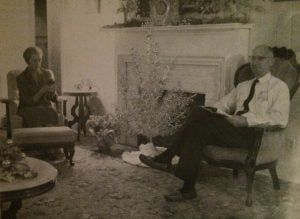It’s Ok . . .

Services were almost over when she came down the center aisle. There was determination in her step, a note held in her hand, and grief etched across her face. She spoke briefly with the minister after handing him her message, returning to the back of the church before the song of invitation ended.
The minister moved to the microphone, holding the note, looking at it as he chose his words carefully. But before he revealed its contents he began his remarks by noting that the story it told was the story of so many in our congregation. I will simply say it is the story of so many.
Her husband had died a little over eighteen months before. And seven months later—just as it seemed the world might be settling down—her son unexpectedly followed his father. Now she was selling the home where so many memories had been made with both of them, moving into another, more manageable property. And she wasn’t handling it as well as she needed to (her words, not mine). There were many who had offered themselves in comfort and support, and she was eternally grateful for those who cared so much, but the passage of time hadn’t lessened her need for their presence.
As our minister spoke I scanned the auditorium, because I knew there were people present who could easily have written that same note. My seat is such that I can see almost everyone who is there, and as my eyes moved about the room, they came to rest upon one woman who sat, looking straight ahead, unmoving with arms folded, but with her nose turning the slightest bit red. Her husband had died just eight short months ago. She, too, had just moved into another house . . . away from the home they had built and filled with memories . . . away from the place their children and grandchildren loved to visit. She is a practical individual who approached her husband’s death much as she did everything else in life, but today I could see the pain on her face.
Toward the back of the building sat a man with whom I went to school. His wife died very suddenly and unexpectedly while on a church trip, and her death rocked our congregation. With a larger than life personality, her loss left an enormous void, and I know not a day goes by that he doesn’t miss the sound of her voice. When the service ended, those close by wrapped him in their arms, surrounding him with love and compassion.
Slightly behind him sat a woman whose husband had succumbed to the cancer he battled for so long. It was approaching two years since his death, but as the preacher read the note he’d been given, she sat with her head in her hands. Though she had family living close by and friends to listen, there were days his absence was overwhelming.
Those were the three I saw, but there were so many others—how many more I will never know. And it doesn’t have to be a spouse. The loss of parents, grandparents, siblings, or—heaven forbid—children can bring about the same depth of grief and sense of hopelessness. A few days later, as I spoke to the woman with whom I began my story, I reminded her that it’s ok not to be ok. And she agreed. It had taken her eighteen months to realize she didn’t have to walk around with a big smile on her face as though life was great and everything was fine. She finally realized she had permission to grieve, openly and publicly. When I asked her if I might share her story, she readily consented. Her reason? If it could help just one person . . .
Any time of year is hard when someone you love is missing, but Thanksgiving and Christmas—the two most family-centered holidays known to man—make the grief even greater, and I’m not sure it matters whether it’s been two months or two years or two decades. Grief doesn’t own a watch, or a calendar, and expecting it to abide by ours is useless. It’s normal to struggle with life’s drastic changes and Time, although helpful, isn’t a cure. Too much has been lost for adjustment to be an easy task—or for things to ever be the same.
So my message to you today is a simple one. It’s ok to tell the world you’re hurting. It’s ok to ask for help when you don’t feel you can continue alone.
It’s ok not to be ok.
The post It’s Ok . . . appeared first on Shackelford Funeral Directors | Blog.












